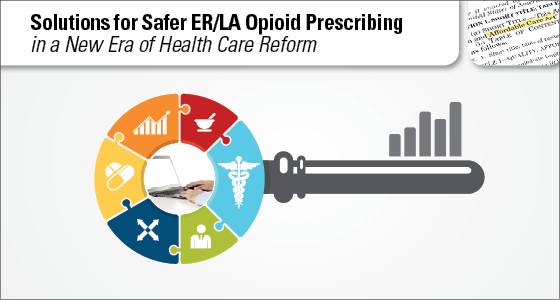
|
Solutions for Safer ER/LA Opioid Prescribing in a New Era of Health Care Reform |
On-demand Archives
Track 1: Embracing New Models of Care Delivery that Lead to Safer ER/LA Opioid Prescribing

Track 2: Implementing a Patient-Centric Approach for Safer ER/LA Opioid Prescribing

Track 3: Leveraging Health Information Technology for Safer ER/LA Opioid Prescribing




|
DISTINGUISHED FACULTY PRESENTERS |
Embracing New Models of Care Delivery that Lead to Safer ER/LA Opioid Prescribing

|
Paul Grundy, MD, MPH IBM's Global Director of Healthcare Transformation President, Patient-Centered Primary Care Collaborative |

|
Joanna L. Starrels, MD, MS Associate Professor of Medicine Division of General Internal Medicine Albert Einstein College of Medicine & Montefiore Medical Center |

|
Melissa B. Weimer, DO, MCR Assistant Professor of Medicine Division of General Internal Medicine and Geriatrics Oregon Health & Science University |
Implementing a Patient-Centric Approach for Safer ER/LA Opioid Prescribing

|
William C. Becker, MD Assistant Professor of Medicine Yale School of Medicine |

|
Angela Golden, DNP, FNP-C, FAANP Family Nurse Practitioner NP from Home, LLC |

|
James B. Rickert, MD Clinical Assistant Professor Indiana University School of Medicine Orthopedic Surgeon Indiana University Health Southern Indiana Physicians |
Leveraging Health Information Technology for Safer ER/LA Opioid Prescribing

|
Christopher Harle, PhD Associate Professor, Health Policy and Management Richard M. Fairbanks School of Public Health Indiana University Purdue University, Indianapolis Affiliated Scientist, Regenstrief Institute |

|
David K. Nace, MD Chief Medical Officer MarkLogic Corporation Board Member Patient-Centered Primary Care Collaborative |

|
TARGET AUDIENCE |

|
STATEMENT OF EDUCATIONAL NEED |
Clinicians will receive information that will allow them to improve their ability to: provide safer treatment to extended-release/long-acting (ER/LA) opioid patient populations, track and coordinate referrals, provide appropriate access and communication, plan and manage care, and measure performance improvement.

|
GOALS OF PROGRAM |
Educate participants on the FDA's REMS Blueprint Core Content while also addressing clinicians' educational needs in evaluating new care models, identifying best practices, and implementing solutions for advancing community-based collaboration in order to improve outcomes for patients on ER/LA opioid therapy.

|
LEARNING OBJECTIVES |
Track 1: (Includes FDA Blueprint elements I and II)
- Describe current guidelines for treatment with ER/LA opioids and opportunities to integrate such guidelines into new models of care delivery
- List quality indicators impacted by non-adherence to national guidelines regarding treatment with ER/LA opioids
- Discuss the importance of shared decision-making and patient education for patients who need or are receiving ER/LA opioids
- Employ 2 patterns of communication that can improve patient/provider communication around ER/LA opioid therapy
- Use the EHR to improve the management of patients taking ER/LA opioids and reduce the opportunity for diversion and abuse
- Describe the benefits of using a state PDMP in improving management of patients receiving ER/LA opioids and reducing the risk of addiction, misuse, and diversion
- Integrate the state PDMP into the practice's EHR to reduce misuse and diversion

|
ACCREDITATION INFORMATION |
- Physicians - maximum of 4.5 AMA PRA Category 1 CreditsTM
- Nurses - 4.5 Nursing Contact Hours
- Complete all 3 learning tracks either by successful completion of the live webcasts held December 2015-February 2016, the enduring web archives, or a mix of both the live and enduring activities.
- Successfully complete post-tests with a score of 75% or better for all 3 learning tracks
- Complete evaluation forms for all 3 learning tracks
- Your participation and successful completion of the activities will be tracked for you
Accreditation Statement
Physician Continuing Medical Education
Accreditation Statement
This activity has been planned and implemented in accordance with the accreditation requirements and policies of the Accreditation Council for Continuing Medical Education (ACCME) through the joint providership of Postgraduate Institute for Medicine and Impact Education, LLC. The Postgraduate Institute for Medicine is accredited by the ACCME to provide continuing medical education for physicians.
Credit Designation
Postgraduate Institute for Medicine designates this 3-part enduring activity for a maximum of 4.5 AMA PRA Category 1 CreditsTM. Physicians should claim only the credit commensurate with the extent of their participation in the activity.
Nursing Continuing Education
Credit Designation
This 3-part educational activity for 4.5 contact hours is provided by Postgraduate Institute for Medicine.
Accreditation Statement
Postgraduate Institute for Medicine is accredited as a provider of continuing nursing education by the American Nurses Credentialing Center's Commission on Accreditation.
Questions
Contact info@impactedu.net with any questions.